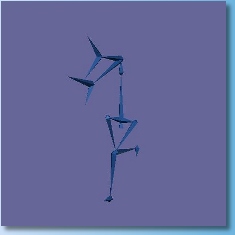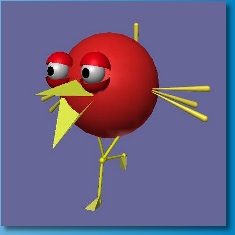|
|



Disclaimer: The information presented on this page represents the personal views, ideas, and opinions of the author. This is not an official Saint Norbert College web page. Links contained at this web site to other organizations are presented as a service and neither constitute nor imply university endorsement or warranty. |
Chicken |
Skeleton |
Body |
1 |
2 |
3 |
4 |
5 |
1. Root Bone - All skeletons must contain a root bone from which all other bones, called child bones, extend. 2. Bottom Jaw - This bone allows the lower beak to move. 3. Top Jaw - This bone allows the upper beak to move. 4. Bottom Eye - This bone allows BOTH of the lower eyelids to move. 5. Top Eye - This bone allows BOTH of the top eyelids to move. * The leg bones also move, allowing the chicken to walk. |
Each object is added to a specific bone, covering the skeleton, and moves along with the bone. Objects that have been added to a bone do not necessarily need to be in contact with it. As long as an object has been added to a bone, it will move as the bone does. As a result, an outside object added to the top eye bone, for example, would move up and down as the top eyelid does. |